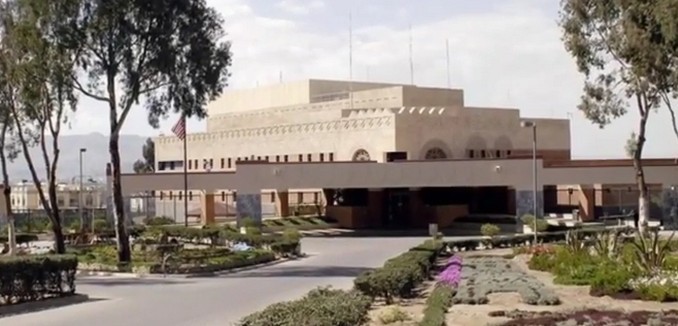Citing the deteriorating security situation, the United States State Department has shut down its embassy in Sana’a, Yemen, The New York Times reported today.
Late Tuesday, Jen Psaki, a State Department spokeswoman, said that because of the “uncertain security situation in Sana’a, we have suspended our embassy operation, and our embassy staff has been temporarily relocated out of Sana’a.”
By Wednesday morning, the embassy had closed and all diplomats and staff were gone, an embassy official said.
The closing made Yemen the third Middle Eastern country with no American embassy, after Syria and Libya.
Due to uncertain security situation in Yemen, we have suspended our embassy operations; embassy staff have been relocated out of Sana’a.
— Department of State (@StateDept) February 11, 2015
In addition to closing the embassy, the State Department issued a travel warning advising all Americans residing in Yemen to leave.
The Department urges U.S. citizens to defer travel to Yemen and those U.S. citizens currently living in Yemen to depart.
Subsequently, the United Kingdom and France shut their embassies too.
The political situation in Yemen has deteriorated significantly since the Iran-backed Houthi rebels took over the capital city of Sana’a last year. The Houthis have stymied efforts to form a new government and last month stormed the presidential palace and kidnapped a top politician. When the Houthis continued to make demands and refused to compromise, the government of American-backed president Abed Rabbo Mansour Hadi resigned.
In November, an Iranian official boasted that Iran had captured its fourth Arab capital, claiming Sana’a, in addition to Beirut, Damascus and Baghdad.
In The Rise of the Iranian Empire, which was published in the February 2015 issue of The Tower Magazine, David Daoud wrote:
The Iranians have not been shy about the spread of their regional influence. Ali Reza Zakani, a member of Iran’s parliament close to Supreme Leader Ayatollah Ali Khamenei, recently boasted, “Three Arab capitals have already fallen into Iran’s hands and belong to the Iranian Islamic Revolution,” suggesting that Sana’a, Yemen is the fourth. As a result, he said, Iran has now reached the stage of “Grand Jihad,” and can impose its will on the entire region.
Hassan Salami, deputy commander of the IRGC, has echoed Zakani’s statement, saying Iran is “capable of controlling the political developments in the region without using military force and without a direct presence on the ground.” The West, he said, has failed to isolate Iran and has been forced to reach out to Tehran for help. The United States, France, and Britain, he claimed, are “begging” Tehran to combat small Islamist organizations like ISIS, while “Iran is on the verge of reaching a new level of power. … Today, our conflict with the West has expanded to the Mediterranean, and this indicates a change in the regional power equations, an increase in our power, and a narrowing of the range of our enemies’ power.” …
Perhaps nothing has proven the veracity of Zakani and Salami’s statements better than recent events in Yemen, which should have set off alarm bells in the West, but—possibly because they are unrelated to the nuclear issue—have not done so. Since last September, the Houthi militia (officially known as Ansar Allah), an Iranian proxy and ally of Hezbollah—their banner, incidentally, contains the slogans, “Death to America, Death to Israel, A curse upon the Jews”—has made increasing progress toward essentially taking over the country.
In effect, the Houthis have launched a coup d’etat against the Yemeni government, a close ally of both the West and Saudi Arabia. Considering the Houthis’ history, this turn of events is surprising only if one ignores Iran’s role. The Houthis are Zaidi Shi’a Muslims. Zaidis were traditionally moderate and politically quietist, in addition to being the closest of the Shi’a schools to the Shafi’i school of Sunni Islam. However, as has occurred with many traditionally quietist Shi’a groups, Iran’s exportation of its Khomeinist Revolutionary ideals—in many ways at odds with traditional Shi’a Islam—have considerably shifted the Zaidis’ traditionally moderate attitude.
[Photo: BBC News / YouTube ]




